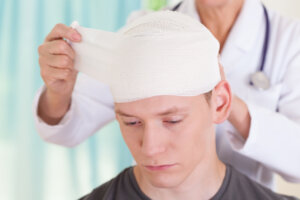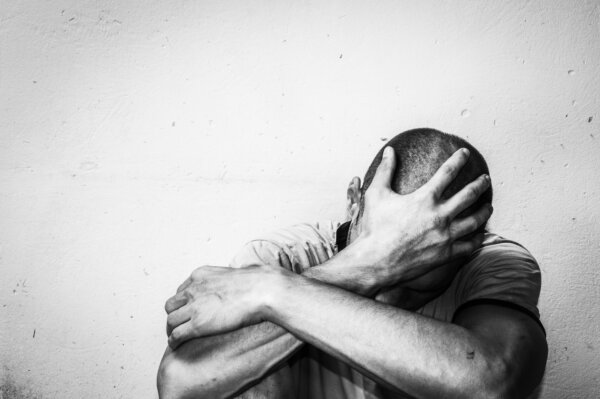The Psychological Impact of Traumatic Brain Injury

As a matter of fact, the most serious accidents tend to happen when we least expect them. Furthermore, the head is one of the most delicate areas of the body when it comes to injuries. Head injuries can range from a traumatic brain injury to other various kinds of concussions.
Most brain injuries are closed head injuries. However, penetrating injuries in which an object enters the skull are also reported frequently. It’s these kinds of injuries that have the most serious consequences. That is why, after any blow to the head, as a preemptive measure, it’s always recommended to consult a doctor.
Traumatic Brain Injury
Traumatic brain injury (TBI) is an injury that directly affects the brain. It causes damage that, depending on the severity, can reach extremes such as coma or death. Furthermore, these kinds of injuries can occur at any time. For example, due to accidents, blows, falls, or even when you’re practicing your favorite sport.
Understanding the psychological impact of a traumatic brain injury is of great help in discerning if the contusion is mild, moderate, or severe. In fact, a blow to the head can completely change a person’s life. It can affect everything, from their mobility and their relationships to the way they feel and express their emotions.
What can cause traumatic brain injury?

It’s important to note that an injury to the head can cause anything from headaches and buzzing sounds to more serious consequences such as depression and anxiety. Therefore, you should always try and protect your body and not expose yourself to dangerous situations.
Here are some of the most common causes of brain injuries:
- Car accidents.
- Being near the kind of explosion that could cause brain damage.
- Direct impact resulting from a fall on a hard surface.
- A blow to the head with a blunt and heavy object.
- Sudden loss of consciousness or fainting.
Psychological impacts of traumatic brain injury
People often experience emotional problems after a traumatic brain injury. Although most usually recover without any consequences, others experience certain psychological changes such as difficulty in managing emotions and controlling mood swings.
Here are some of the main psychological and emotional consequences of a traumatic brain injury.
1. Attacks of irritability and personality changes
An article by Tessa Hart, a scientist at the Moss Rehabilitation Research Institute states that one of the main factors in traumatic brain injury concerns other issues surrounding the accident. For example, job loss, physical ailments, and difficulty in concentrating. The sufferer may also feel frustrated due to their loss of independence.
“People with brain injuries can learn some basic anger-management such as self-calming strategies, relaxation, and better communication methods. A psychologist or other mental health professional familiar with TBI can help”.
2. Anxiety and depression problems

Various investigations have shown that two of the main psychological impacts of a traumatic brain injury are depression and anxiety. As a matter of fact, these mental disorders are six times more likely to develop in this type of patient than in the general population. The symptoms can even persist for several years after the accident.
In fact, depending on its impact and the sufferer’s subsequent physical limitations, they may begin to have a negative view of their reality, post-trauma. This is because it can be quite challenging for them to immediately make a complete return to the life they had before suffering the injury.
3. Manic syndrome and psychosis
As a rule, the kinds of alterations that completely change the life of the sufferer and the way they behave are among the less common consequences of a blow to the head. As for mania, studies have concluded that it usually has an incidence of around seven percent after a head injury.
With regards to psychosis, it’s believed that the most affected area that could be responsible for this condition after brain injury is the temporal lobe. Of course, personal history, such as previous drug use or the development of post-traumatic epilepsy should also be considered. The condition may be treated with antipsychotics.
Traumatic brain injury can happen to anyone
As much as we take care of our bodies to lead mentally and physically healthy lives, we can’t legislate for the intervention of fate. Indeed, any one of us could suffer an accident when we least expect it.
It must always be remembered that, in the event of a traumatic brain injury, the support of family and loved ones is of vital importance. Of course, this is in addition to surgery, medications, and rehabilitation theories. Together, they’ll gradually heal any remaining physical and emotional damage.
Bibliography
- Eisenberg J. (2011). La depresión después de una lesión cerebral: Guía para pacientes y personas que ayudan con el cuidado. In: Las Guías Sumarias de los Consumidores. Rockville (MD): Agency for Healthcare Research and Quality (US); 2006-. Available at: https://www.ncbi.nlm.nih.gov/books/NBK95297/
- Hart T., Cicerone K. (2002). Problemas emocionales después de una lesión cerebral traumática. Instituto Nacional de Investigación sobre la Discapacidad y Rehabilitación en el Departamento de Educación de los EE. UU. Available at: https://msktc.org/lib/docs/Factsheets/Spanish_Factsheets/TBI-Emotional_Sp.pdf
- A., Agudelo V. (2007). Trastornos neuropsiquiátricos por trauma craneoencefálico. Revista Colombiana de Psiquiatría, 36 (Suppl. 1), 40-51.Available at: http://www.scielo.org.co/scielo.php?script=sci_arttext&pid=S0034-74502007000500006&lng=en&tlng=es.
This text is provided for informational purposes only and does not replace consultation with a professional. If in doubt, consult your specialist.








